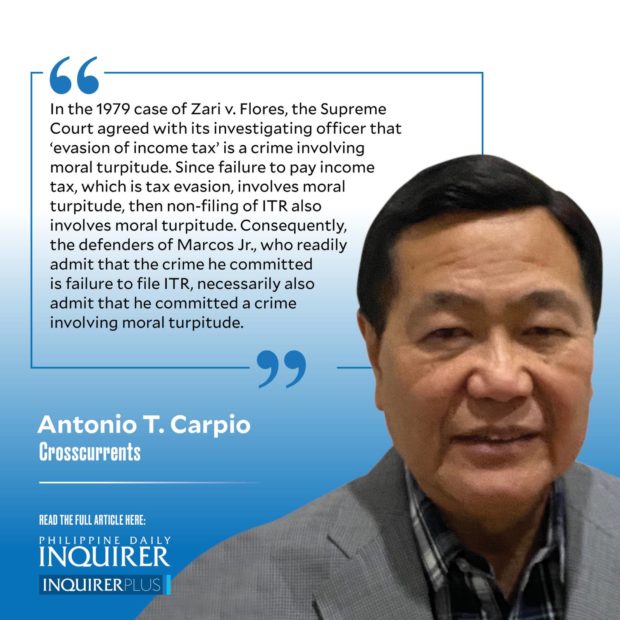Non-filing of income tax return
The principal defense of Ferdinand R. Marcos Jr. in the disqualification case is that his conviction for violation of the Tax Code is merely for non-filing of his income tax returns (ITR) from 1982 to 1985 and not for nonpayment of income taxes. Marcos Jr.’s defenders claim that the non-filing of his ITRs did not involve moral turpitude as there was no tax evasion. They assert that Marcos Jr. fully paid his income taxes from 1982 to 1985 under the withholding tax system which applied to his salaries as Vice Governor and later as Governor of Ilocos Norte.
The withholding tax on income is just an advance payment of the total taxes that are finally due at the end of the tax year. It does not follow that the withholding taxes will be the same as the final tax as the withholding taxes may be less or even more than the final tax. In the case of individuals, the status of the individual, whether or not married and with children, will often determine the existence of deficiency income taxes at the end of the tax year.
Article continues after this advertisementWhether Marcos Jr. was convicted of tax evasion depends on what the fallo or dispositive portion of the Court of Appeals’ (CA) decision states. The fallo states the definitive judgment of the court. It is the fallo that is subject to execution or implementation. The fallo of the Oct. 31, 1997 CA decision states: “WHEREFORE, the Decision of the trial court is hereby MODIFIED as follows: 1. ACQUITTING the accused-appellant of the charges of violation of Section 50 of the NIRC for non-payment of deficiency taxes for taxable years 1982 to 1985 xxx; 2. Ordering the appellant to pay to the BIR the deficiency income taxes due with interest at the legal rate until fully paid; 3. Ordering the appellant to pay a fine of P2,000.00 for each charge in Criminal Cases Nos. xxx for failure to file income tax return for 1982, 1983 and 1984; and a fine of P30,000.00 in Criminal Case No. xxx for failure to file income tax return for 1985, with surcharges.” The CA decision became final and executory on Aug. 8, 2001 when the Supreme Court granted Marcos Jr.’s motion to withdraw his appeal.
Inexplicably, the fallo of the CA decision acquitted Marcos Jr. of nonpayment of income taxes but at the same time required him to pay deficiency income taxes, which can only be required in case of nonpayment of income taxes. Paragraphs 1 and 2 of the fallo are clearly inconsistent with each other. The CA decision stated that there was a “stipulation entered into between appellant (Marcos Jr.) and the appellee (prosecution) with regard to the amount of deficiency income taxes of the former” which must “still be satisfied by him.” This is a categorical judicial admission by Marcos Jr. of nonpayment of income taxes, and thus of tax evasion. In case of conflict between the fallo and the body of the decision, the fallo prevails. But in this CA decision, the fallo is also inconsistent with itself.
The fallo of the CA decision presents us with “a riddle, wrapped in a mystery, inside an enigma.” Fortunately, there is a way out of this conundrum. The Tax Code considers failure to file ITR and failure to pay income tax as crimes of the same nature and gravity because these two crimes are found in the same Section 255 of the Tax Code and they carry exactly the same penalties. If failure to pay income tax is a crime involving moral turpitude, then failure to file ITR is also a crime involving moral turpitude. If failure to file ITR is repeatedly committed for several years as in the case of Marcos Jr., there should be no doubt whatsoever that such failure involves moral turpitude.
In the 1979 case of Zari v. Flores, the Supreme Court agreed with its investigating officer that “evasion of income tax” is a crime involving moral turpitude. Since failure to pay income tax, which is tax evasion, involves moral turpitude, then non-filing of ITR also involves moral turpitude. Consequently, the defenders of Marcos Jr., who readily admit that the crime he committed is failure to file ITR, necessarily also admit that he committed a crime involving moral turpitude.

















